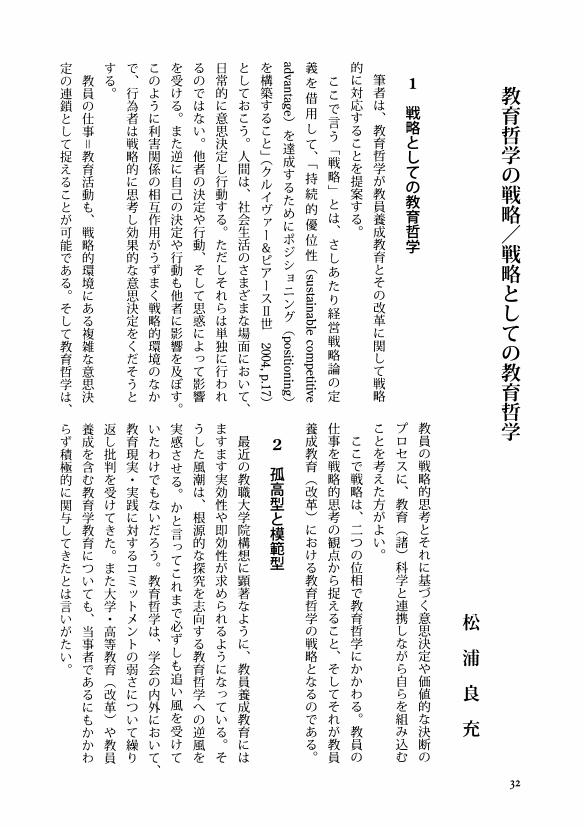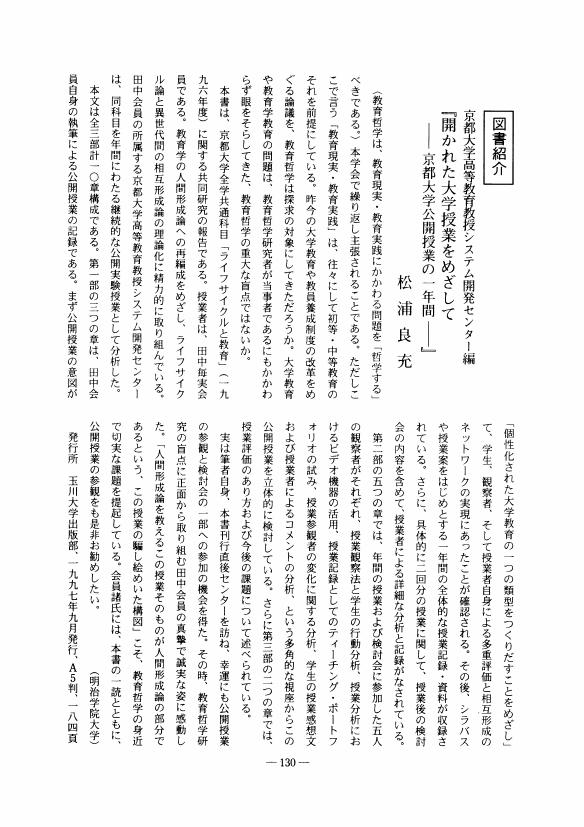10 0 0 0 OA 実学(サイヤンス)する教育心理学
3 0 0 0 OA 技術革新にともなう「知識」の変容と教育(学)の課題 ——討論のひとつの観点として——
- 著者
- 松浦 良充
- 出版者
- 一般社団法人 日本教育学会
- 雑誌
- 日本教育学会大會研究発表要項 (ISSN:2433071X)
- 巻号頁・発行日
- vol.80, pp.257-258, 2021-08-16 (Released:2021-10-22)
- 著者
- 松浦 良充
- 出版者
- 同志社大学文学部教育学研究室
- 雑誌
- 教育文化 (ISSN:09168869)
- 巻号頁・発行日
- no.13, pp.111-87, 2004-03
2 0 0 0 田中智志著『人格形成概念の誕生-近代アメリカの教育概念史-』
- 著者
- 松浦 良充
- 出版者
- The Japanese Society for the Philosophy of Education
- 雑誌
- 教育哲学研究 (ISSN:03873153)
- 巻号頁・発行日
- no.94, pp.128-136, 2006
教育哲学と教育思想史研究との関係をどのように考えるか。<BR>この問題を、私たちの学会はくりかえし問うてきた。現在でもさまざまな立場や議論が存在するだろう。これまで教育哲学の名の下に展開してきた研究の少なからぬ部分が、教育思想、特に欧米のそれらの紹介や分析であったことは周知の事実である。そしてそのような実態に対して、しばしば強い懸念が示されてきてもいる。他方教育哲学は、現在の日本の教育問題に対して考察を挑もうとするとき、その枠組みをなす概念装置を必要とする。そうした概念装置をより精緻で有効なものに練りあげるために、既存の教育思想を資源として活用することは論難されるべきことではない。しかも「教育」という概念や認識の枠組みが、近代社会において生成した歴史的な構成物であることを考慮に入れれば、欧米の教育思想が参照されることには一定の正当性があると言えよう。<BR>もっとも、教育哲学の名の下に展開している教育思想の研究が、必ずしも教育思想史研究になっているわけではない。それらの多くは、その教育思想が課題として直面したはずの社会的状況や歴史的文脈とは無関係に、ただ抽象的な概念のみが抽出されて論じられることが多いからである。かといつて社会的・歴史的視点がないのが教育哲学、あるのが教育思想史ということにはならない。実は、現代日本の教育問題自体が歴史的文脈のなかで構成されているのである。したがって教育哲学の考察も必然的に歴史的な視野をふまえて展開されるべきである。そうした視野や文脈を無視するからこそ、教育哲学が教育の現実的問題に有効なはたらきをなしえていない、との批判を浴びることにもなるのであろう。<BR>一方、教育思想史研究も、それが単なる過去や異国へのディレッタント的な関心以上のものをめざすのならば、現代の教育問題とそれを構成している歴史的文脈と無関係なところに、その研究課題を設定するわけにはゆかない。その意味で、教育哲学と教育思想史研究は、それぞれが対象とする課題の歴史的文脈を照合しつつ、共有できる概念装置を練りあげるために協働することができるはずである。そしてその接点を構成するのが、教育にかかわる概念史研究である。
- 著者
- 松浦 良充
- 出版者
- 一般社団法人日本教育学会
- 雑誌
- 教育學研究 (ISSN:03873161)
- 巻号頁・発行日
- vol.66, no.4, pp.417-426, 1999-12-30
本論文は、アメリカ高等教育史における「リベラル・エデュケイション」および「ジェネラル・エデュケイション」概念の意味と、その相互関係の明確化を試みるものである。この作業を通して、現在私たちが直面している課題である、日本の大学における<教養>について再考する際の示唆を得る。そしてそのための事例として、シカゴ大学カレッジにおける改革の現状と歴史を考察する。シカゴ大学カレッジは、1999年、1984年以来の学士課程カリキュラムを改訂したが、この改革に関しては多くの議論がまきおこっている。なぜならば新カリキュラムは,シカゴ大学の伝統である共通コア科目を縮小し、その分、選択科目枠を拡大するものであったからだ。さらにシカゴ大学カレッジは、創立以来現在に至るまで、アメリカ合衆国における有数の研究志向大学であるにもかかわらず、ロバート・メイナード・ハッチンズ学長・総長時代(1929∼1951 年)に、学士課程カレッジのカリキュラムおよび組織に関してユニークな実験的改革の経験をもっている。しかしながら今回の改革は、多元文化社会におけるリベラル・エデュケイションの新たな概念構成が,共通コア科目からなる一般教育と、専攻(専門)教育、さらに、教室外や国外にさえおよぶ学生の自主学習・研究を含むものへと、再構築されるべきことを示唆している。筆者は、シカゴ大学の改革から、日本の高等教育における<教養>教育概念の再構築のための新たな参照枠を得ることができると考えている。 本稿の議論は、以下の手順によって進めてゆく。第一に、日本の高等教育が、戦後新制大学のモデルとしたつもりであったアメリカにおける「リベラル・エデュケーション」および「ジェネラル・エデュケーション」(教養教育)が、学士課程の専門(専攻)教育と本質的に対立するものである、との誤解がなされてきた。そうした理解は、アメリカにおけるリベラル・エデュケイション概念の意味には含まれていない。第二に、リベラル・エデュケイションの思想史を、とくに、ブルース・A・キンバルによる、「弁論家」の系譜と「哲学者」の系譜という枠組みを参考にしながら、整理・検討する。それによれば、リベラル・エデュケイションの歴史は、弁論家たちによる「アルテス・リベラルス理念」と哲学者たちによる「リベラル-フリー理念」との間の一連の論争の歴史である。そして、いまや両者の理念の統合が求められている。第三に、シカゴ大学カレッジの1999年度カリキュラム改革および実験的改革の歴史について検討する。シカゴ大学カレッジのリベラル・エデュケイションは、コモン・コアによる一般教育、専攻(専門)教育、および自由選択科目から構成されているが、今回の改革では、教室外やキャンパス外にも教育活動を拡張することをめざしている。そしてそれは、リベラル・エデュケイションにおける「アルテス-リベラルス理念」と「リベラル-フリー理念」の統合を試みるものである。そして以上の考察を経て最後に、筆者は、専攻(専門)教育や課外の教育活動を含みこんだ形での、新たな日本の学士課程における教養教育を構築することが必要であると結論する。
- 著者
- 松浦 良充
- 出版者
- 教育思想史学会
- 雑誌
- 近代教育フォーラム (ISSN:09196560)
- 巻号頁・発行日
- no.22, pp.1-17, 2013-09-14
ハッチンズはその生涯の大半を大学像の探究に捧げた。そしてその大学像の構成には、教育概念が重要な役割を担っていた。本稿では、20代半ばから大学の管理運営にかかわり、30歳でシカゴ大学の学長に抜擢された彼の大学像・教育概念の変遷とその意味を考える。彼は研究志向の強い多機能的総合大学の統合原理として「教育」を位置づけた。それによって大学の知的再生産機能を作用させようとしたのである。大学を去った後にも彼の大学像の探究は継続された。ただし「教育」の役割に関する考え方には変化が生ずる。大学・教育が社会からの要請に従属的である、との認識を強めるのである。大学・教育は社会を変革できないのか。ならばどうすればよいのか。晩年に展開された「ラーニング・ソサエティ」に至る思想的挑戦のなかで、彼はその課題にいかなる解答を見出そうとしたのか。
1 0 0 0 OA 「高等」教育とはなにか : 思想史が問う(コロキウム5)
- 著者
- 松浦 良充
- 出版者
- 教育思想史学会
- 雑誌
- 近代教育フォーラム (ISSN:09196560)
- 巻号頁・発行日
- vol.11, pp.109-121, 2002-12-04 (Released:2017-08-10)
「教育的関係」をめぐって、現在、相反する二つの状況が見られる。教育や人間形成環境における「関係性」の喪失や危機が叫ばれる一方で、これまで「教育的関係」が意識されなかったような、たとえば大学・高等教育などの領域において、その増殖・強化が指摘される。教育学においては、19世紀末から20世紀にかけて教育関係論という認識枠組みが成立したが、それはやがて教育的相互作用論にシフトした。しかしそれは結局「教育的関係」の喪失を追認する役割を果たし、またその危機と増殖というアンビヴァレントな状況を説明する有効な診立てを提供できていない。さらに「教え-学ぶ」という教育関係論の概念装置は、関係性の媒介項として「内容」を想定する場合に、より現実的な認識を提供することを予感させる。ただしこれについても「学び」の強調によって、相互作用論と同様の結果をもたらしている。そこから本稿は、既存の教育学や心理学の影響を受ける以前の、Learning概念の思想史的研究を展望する。
1 0 0 0 OA 教育哲学の戦略/戦略としての教育哲学
- 著者
- 松浦 良充
- 出版者
- 教育哲学会
- 雑誌
- 教育哲学研究 (ISSN:03873153)
- 巻号頁・発行日
- vol.2007, no.95, pp.32-37, 2007-05-10 (Released:2009-09-04)
- 参考文献数
- 5
1 0 0 0 OA 田中智志著『人格形成概念の誕生-近代アメリカの教育概念史-』
- 著者
- 松浦 良充
- 出版者
- 教育哲学会
- 雑誌
- 教育哲学研究 (ISSN:03873153)
- 巻号頁・発行日
- vol.2006, no.94, pp.128-136, 2006-11-10 (Released:2009-09-04)
教育哲学と教育思想史研究との関係をどのように考えるか。この問題を、私たちの学会はくりかえし問うてきた。現在でもさまざまな立場や議論が存在するだろう。これまで教育哲学の名の下に展開してきた研究の少なからぬ部分が、教育思想、特に欧米のそれらの紹介や分析であったことは周知の事実である。そしてそのような実態に対して、しばしば強い懸念が示されてきてもいる。他方教育哲学は、現在の日本の教育問題に対して考察を挑もうとするとき、その枠組みをなす概念装置を必要とする。そうした概念装置をより精緻で有効なものに練りあげるために、既存の教育思想を資源として活用することは論難されるべきことではない。しかも「教育」という概念や認識の枠組みが、近代社会において生成した歴史的な構成物であることを考慮に入れれば、欧米の教育思想が参照されることには一定の正当性があると言えよう。もっとも、教育哲学の名の下に展開している教育思想の研究が、必ずしも教育思想史研究になっているわけではない。それらの多くは、その教育思想が課題として直面したはずの社会的状況や歴史的文脈とは無関係に、ただ抽象的な概念のみが抽出されて論じられることが多いからである。かといつて社会的・歴史的視点がないのが教育哲学、あるのが教育思想史ということにはならない。実は、現代日本の教育問題自体が歴史的文脈のなかで構成されているのである。したがって教育哲学の考察も必然的に歴史的な視野をふまえて展開されるべきである。そうした視野や文脈を無視するからこそ、教育哲学が教育の現実的問題に有効なはたらきをなしえていない、との批判を浴びることにもなるのであろう。一方、教育思想史研究も、それが単なる過去や異国へのディレッタント的な関心以上のものをめざすのならば、現代の教育問題とそれを構成している歴史的文脈と無関係なところに、その研究課題を設定するわけにはゆかない。その意味で、教育哲学と教育思想史研究は、それぞれが対象とする課題の歴史的文脈を照合しつつ、共有できる概念装置を練りあげるために協働することができるはずである。そしてその接点を構成するのが、教育にかかわる概念史研究である。
1 0 0 0 OA 杉浦 宏編『現代デューイ思想の再評価』
- 著者
- 松浦 良充
- 出版者
- 教育哲学会
- 雑誌
- 教育哲学研究 (ISSN:03873153)
- 巻号頁・発行日
- vol.2004, no.89, pp.171-172, 2004-05-10 (Released:2009-09-04)
1 0 0 0 OA 「教育」できるものとしての「教養」の語り方 教養論の歴史から
- 著者
- 松浦 良充
- 出版者
- 教育哲学会
- 雑誌
- 教育哲学研究 (ISSN:03873153)
- 巻号頁・発行日
- vol.2003, no.87, pp.35-39, 2003-05-10 (Released:2009-09-04)
- 参考文献数
- 13
1 0 0 0 OA 教育哲学を考える
- 著者
- 松浦 良充
- 出版者
- 教育哲学会
- 雑誌
- 教育哲学研究 (ISSN:03873153)
- 巻号頁・発行日
- vol.2001, no.83, pp.90-91, 2001-05-10 (Released:2009-09-04)
1 0 0 0 OA D・ボブ・ゴーウィン著竹内巧・佐野安仁監訳『エデュケイティング』
- 著者
- 松浦 良充
- 出版者
- 教育哲学会
- 雑誌
- 教育哲学研究 (ISSN:03873153)
- 巻号頁・発行日
- vol.2000, no.82, pp.105-106, 2000-11-10 (Released:2009-09-04)
1 0 0 0 OA 「教員」は「養成」できるのか 教員養成教育における対立構図の克服へ向けて
- 著者
- 松浦 良充
- 出版者
- 教育哲学会
- 雑誌
- 教育哲学研究 (ISSN:03873153)
- 巻号頁・発行日
- vol.1999, no.79, pp.12-17, 1999-05-10 (Released:2009-09-04)
- 参考文献数
- 14
- 著者
- 松浦 良充
- 出版者
- 教育哲学会
- 雑誌
- 教育哲学研究 (ISSN:03873153)
- 巻号頁・発行日
- vol.1998, no.77, pp.130, 1998-05-10 (Released:2009-09-04)
- 著者
- 松浦 良充
- 出版者
- 教育哲学会
- 雑誌
- 教育哲学研究 (ISSN:03873153)
- 巻号頁・発行日
- vol.1986, no.54, pp.57-71, 1986-11-10 (Released:2009-09-04)
- 参考文献数
- 60
The purpose of this paper is, by means of a critical examination, to point out problems in the logical structure of an educational reform plan proposed by the paideia group under the direction of Mortimer J. Adler during the years 1982-1984.These reflections include the following points : (1) Under what kind of problem awareness in connection with the social and educational situation in America did Adler develop his reform plans ?(2) To what degree does his reform plan conform to his problem awareness ?As a result of these reflections the following points become clear : Adler's problem awareness included two points : (1) For the realization of democratic education it is necessary to establish an educational system with quantative and qualitative equality ; (2) educational reform is necessary for the economic development of America. On this basis he maintains that all American children should be offered the same educational objectives and the same educational curriculum. However, by analyzing the logical structure of the reform conception it becomes clear that (1) in his concept of 'equality', the inequality 'in the point of degree' of children's capacity on the one hand, and the inequality of the educational 'outcome' on the other hand, is presupposed ; (2) school education is expected to serve the function of promoting the values of the existing industrial society. These two points are in conflict with Adler's problem awareness and thus his reform theory contains, from the viewpoint of logical structure, problems as yet to be overcome.
1 0 0 0 OA リベラル・エデュケイションにおける「自由」の意味 R・M・ハッチンズの場合
- 著者
- 松浦 良充
- 出版者
- 教育哲学会
- 雑誌
- 教育哲学研究 (ISSN:03873153)
- 巻号頁・発行日
- vol.1985, no.51, pp.56-70, 1985-05-10 (Released:2010-01-22)
- 参考文献数
- 53
The purpose of this paper is to examine and clarify the meaning of the concept of 'freedom' in the philosophy of liberal education of Robert M. Hutchins.The term 'freedom' is always a controversial concept in regard to many contemporary problems of education. This is due to the ambiguity of its meaning. Hence, this paper as a kind of case study, tries to examine and to readjust this controversial concept by taking as an example Hutchins' concept of 'liberal' education.The logical structure of Hutchins' theory of liberal education includes the following three theses1. Liberal education was originally (in ancient Greece) the education suited to free men who were political rulers.2. At present, universal suffrage, the foundation of democracy, makes every man a ruler; industry garantees everybody leisure, hence every man can become a free man.3. Consequently at our time liberal education is the education for all men.Furthermore, this paper examines the above-mentioned concepts of 'liberal' educationand '
- 著者
- 松浦 良充
- 出版者
- 一般社団法人 日本教育学会
- 雑誌
- 教育学研究 (ISSN:03873161)
- 巻号頁・発行日
- vol.66, no.4, pp.417-426, 1999-12-30 (Released:2007-12-27)
本論文は、アメリカ高等教育史における「リベラル・エデュケイション」および「ジェネラル・エデュケイション」概念の意味と、その相互関係の明確化を試みるものである。この作業を通して、現在私たちが直面している課題である、日本の大学における<教養>について再考する際の示唆を得る。そしてそのための事例として、シカゴ大学カレッジにおける改革の現状と歴史を考察する。シカゴ大学カレッジは、1999年、1984年以来の学士課程カリキュラムを改訂したが、この改革に関しては多くの議論がまきおこっている。なぜならば新カリキュラムは,シカゴ大学の伝統である共通コア科目を縮小し、その分、選択科目枠を拡大するものであったからだ。さらにシカゴ大学カレッジは、創立以来現在に至るまで、アメリカ合衆国における有数の研究志向大学であるにもかかわらず、ロバート・メイナード・ハッチンズ学長・総長時代(1929∼1951 年)に、学士課程カレッジのカリキュラムおよび組織に関してユニークな実験的改革の経験をもっている。しかしながら今回の改革は、多元文化社会におけるリベラル・エデュケイションの新たな概念構成が,共通コア科目からなる一般教育と、専攻(専門)教育、さらに、教室外や国外にさえおよぶ学生の自主学習・研究を含むものへと、再構築されるべきことを示唆している。筆者は、シカゴ大学の改革から、日本の高等教育における<教養>教育概念の再構築のための新たな参照枠を得ることができると考えている。 本稿の議論は、以下の手順によって進めてゆく。第一に、日本の高等教育が、戦後新制大学のモデルとしたつもりであったアメリカにおける「リベラル・エデュケーション」および「ジェネラル・エデュケーション」(教養教育)が、学士課程の専門(専攻)教育と本質的に対立するものである、との誤解がなされてきた。そうした理解は、アメリカにおけるリベラル・エデュケイション概念の意味には含まれていない。第二に、リベラル・エデュケイションの思想史を、とくに、ブルース・A・キンバルによる、「弁論家」の系譜と「哲学者」の系譜という枠組みを参考にしながら、整理・検討する。それによれば、リベラル・エデュケイションの歴史は、弁論家たちによる「アルテス・リベラルス理念」と哲学者たちによる「リベラル-フリー理念」との間の一連の論争の歴史である。そして、いまや両者の理念の統合が求められている。第三に、シカゴ大学カレッジの1999年度カリキュラム改革および実験的改革の歴史について検討する。シカゴ大学カレッジのリベラル・エデュケイションは、コモン・コアによる一般教育、専攻(専門)教育、および自由選択科目から構成されているが、今回の改革では、教室外やキャンパス外にも教育活動を拡張することをめざしている。そしてそれは、リベラル・エデュケイションにおける「アルテス-リベラルス理念」と「リベラル-フリー理念」の統合を試みるものである。そして以上の考察を経て最後に、筆者は、専攻(専門)教育や課外の教育活動を含みこんだ形での、新たな日本の学士課程における教養教育を構築することが必要であると結論する。
1 0 0 0 OA 「教養教育」とは何か
- 著者
- 松浦 良充
- 出版者
- 日本哲学会
- 雑誌
- 哲学 (ISSN:03873358)
- 巻号頁・発行日
- vol.2015, no.66, pp.83-100, 2015-04-01 (Released:2017-06-10)
- 参考文献数
- 2
The concept of “KYOYO Education” (which means liberal and general education in Japanese) is controversial. Colleges and Universities in Japan have experienced large-scale reforms since the 1990s up to now, and the renovation of liberal or general education in undergraduate colleges has been one of the most important issues. After World War II, the idea and system of general education were introduced to Japanese Colleges and Universities, but they did not accommodate themselves to the Japanese higher education system. The system of general education in Japanese undergraduate colleges was formally and legally abolished in 1991 and the “KYOYO Education” instead of general education made a dashing appearance on the higher education scene in its place. KYOYO is a unique Japanese concept - though one which has been influenced by Western educational ideas, for example, paideia (in Greek), humanitas or artes liberales (in Latin), Bildung (in German), or in English culture, liberal arts, liberal education and general education. Recently “KYOYO Education” is sometimes used as an interchangeable term for general education, though it is simultaneously believed that the concept means liberal education. This paper examines the concept of “KYOYO Education” in relation to the historical development of the two concepts of general education and liberal education in the United States.










